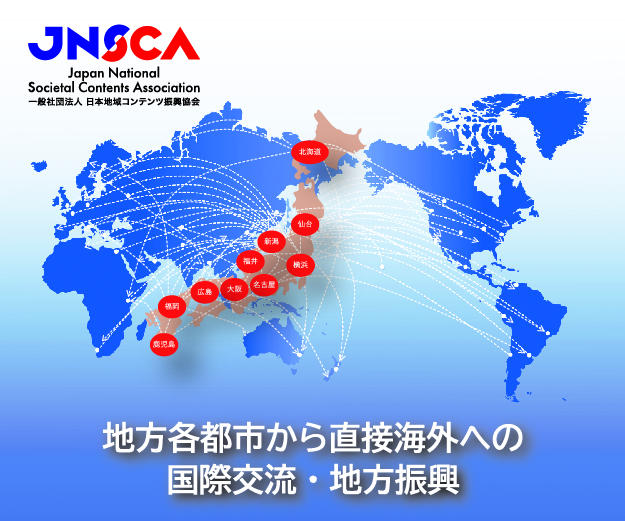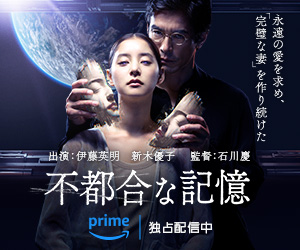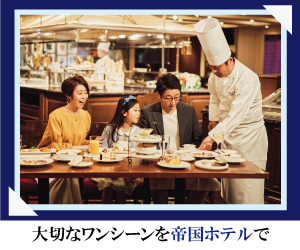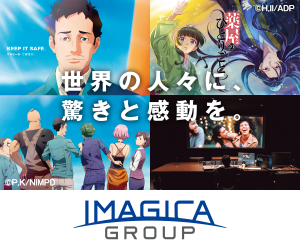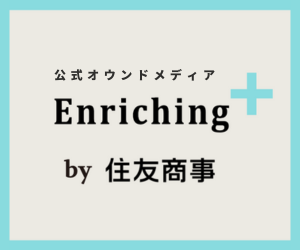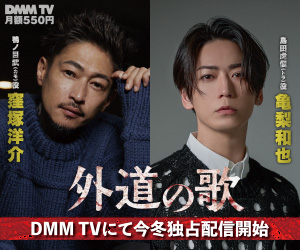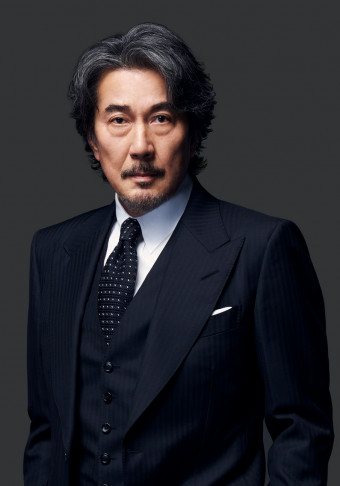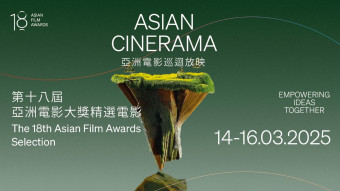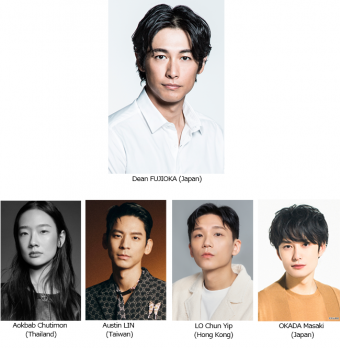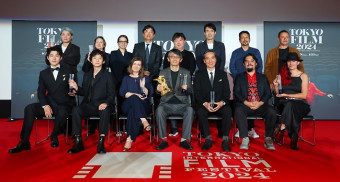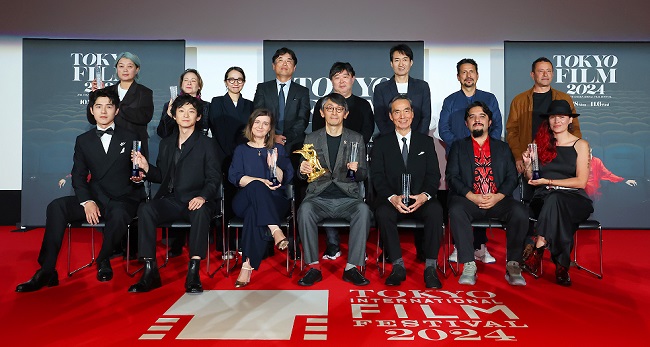
The 37th Tokyo International Film Festival (TIFF) concluded on November 6, following 10 days of screenings and events at the festival’s venues in the Hibiya-Marunouchi-Yurakucho-Ginza area. The festival screened 208 films, with 61,576 admissions and another 96,866 people attending related events.
Among the many highlights of this year’s festival were a thronged Red Carpet opening event, masterclasses with the likes of Hong Kong action legend Sammo Hung and horror maestro Kurosawa Kiyoshi, TIFF Lounge talk sessions between today’s leading creators, SRO crowds at a full-day Women’s Empowerment symposium, enhanced international exchanges, and a 20 percent increase in filmmakers and guests.
During the Closing Ceremony at Toho Cinemas Hibiya, winners were announced for a range of awards, culminating in the Tokyo Grand Prix, The Governor of Tokyo Award, which comes with 3 million yen in prize money.
The ceremony began with a video of highlights from the festival, including footage and snapshots of indoor and outdoor stage appearances, Q&A sessions, masterclasses, symposia and TIFF Lounge sessions.
Awards were then announced for the Asian Future section. Jury member Yamashita Koyo told the audience, “While deliberating, it was clear that the three members of the jury had similar views on the films, and it seemed easy to decide on the award. But ultimately, it was a very difficult task to select only one award winner from the 10 films entered in the competition. Works that are ambitious and experimental with new expressions, works with skillful cinematic storytelling techniques that draw you into the story and the emotions of the characters. The discussion during the screening was also a process of reaffirming what each of us were looking for in a film. In the end, we narrowed down the list to two films, but another lengthy discussion ensued, and finally, we came to a unanimous and satisfactory conclusion.”
Jury member Nia Dinata then announced the winner, saying, “The Asian Future best film this year has genuine wit, with standout performances from both the protagonist and supporting characters, adding layers of depth to the narrative. The film is not only engaging but visually captivating, connecting past and present in an effortlessly refreshing way. The Asian Future Best Film Award goes to Apollon by Day Athena by Night, directed by Emine Yildirim.”
Turkish director Emine Yildirim came on stage to accept the Asian Future Best Film Award from jury member Yokohama Satoko, saying, “I’m amazed. Thank you so much. Thank you, Tokyo International Film Festival. Thank you, honorable jury members. I’m so honored for myself and my entire team. This film was a true collaboration between onscreen artists and offscreen artists, who put their entire hearts and souls into it with me. Thank you to my entire cast and crew. I especially want to thank two women who took this journey with me from start to finish: one is my lead actress Ezgi Çelik, who has the heart of a lion, and the other is my producer Dilde Mahalli, who has the mind of a sage. It was female solidarity that allowed us to make this film against all odds. So I’d like to dedicate this award to the women of the Middle East. Thank you so much.”
TIFF Chairman Ando Hiroyasu then came on stage to announce the winner of the coveted TIFF Audience Award, noting “This film depicts a character who is disabled but lives resiliently. I felt that the actor was really amazing. We screened the film three times and sold out every screening. I think everyone was in agreement that this clearly deserves to be our Audience Award winner: Big World by Yang Lina.”
Chinese director Yang Lina accepted the TIFF Audience Award and commented, “Thank you very much to the Tokyo International Film Festival. I’m very happy to receive this Audience Award, it’s an honor. A film has to be something that talks to your heart, and the protagonist Chunhe, a representative of the younger generation [has done so]. He is a normal person. Thank you very much for the love you felt for this film, and I would like to also thank my producers and creative team.”
Juror Enyedi Ildikó then presented the Award for Best Artistic Contribution, saying, “For the bold vision transforming reality into an intense inner landscape, the award for Best Artistic Contribution goes to Lu Songye, the cinematographer of My Friend An Delie.”
The Chinese film’s director, Dong Zijian, accepted the award and told the audience, “I’d like to extend my gratitude to the jury and the Tokyo International Film Festival, as well as to all those involved in the production of this film. I want to especially thank someone who’s in the audience tonight, Liu Haoran, who plays my best friend in the cast. This was my debut film and I created it together with my friends. There was a lot of snow in the film, which covered my heart, but I do believe that the sun will come out. Thank you again very much.”
Jury President Tony Leung, an acclaimed actor himself, presented the Award for Best Actor. “From the moment he stepped onto the screen, he captivated us with his depth and authenticity,” he said. “The Award for Best Actor goes to Nagatsuka Kyozo in Teki Cometh.
Best Actor Award winner Nagatsuka Kyozo, a veteran stage and screen performer who has his first leading film role in 12 years with Teki Cometh, told the audience: “The other day, I was walking on the red carpet and just a few days later, I found out that I was going to come back for the Closing Ceremony. I was so surprised. This film is about a character who lives alone in his old age, and feels that he’s surrounded by enemies. But I think there are allies as well (as he held up his trophy). I thought I was going to retire, but now I think I might continue a little longer. This is going to disappoint my wife. Thank you, Tokyo International Film Festival, for being my ally.”
Juror Chiara Mastroianni announced the Best Actress Award, noting, “For her powerful interpretation carrying the film, it is a great pleasure to give the award to this wonderful actress, Anamaria Vartolomei from Traffic.
Best Actress Award winner Anamaria Vartolomei, speaking via video, told the audience: “Hi, Tokyo International Film Festival. What a surprise! Thank you very much. I’m beyond grateful and honored to receive this award. Teodora, you are there. Thank you for being such a supportive and sensitive director. Tudor, our producer, thank you for your passion. Cristian Mungiu, for being such a genius, simply, and letting me be part of this. And I have to share this award with all my partners. I’ve never seen such hard workers and it was a true learning experience for me to work with you. And I’m glad that my first Romanian-language movie was with this crew.
“Thank you to the jury, Enyedi Ildikó, Hashimoto Ai, Johnnie To, Chiara Mastroianni. I deeply appreciate and respect your work. And finally, thank you Mr. Tony Leung, the one and only. You are a living legend, and I have to express my admiration. Right now this only happens once in a lifetime. I wish I were there — it would have made this even more special. You inspire me a lot. My character Natalia, she doesn’t speak very much; she’s not very talkative. She expresses a lot with her eyes. You are the one we call “the man who can speak with his eyes.” Coming from you, [this award] makes my joy explode. Thank you very much again. And, have a beautiful ending ceremony. (throwing a kiss) Bye!”
Juror Johnnie To presented the Award for Best Director. “Konbanwa. (switching to Cantonese) The director uses the protagonist’s home as the primary setting,” he said. “Through effective cinematic language, he intricately portrays the mindset of the elderly character and the issues he faces, creating a deeply moving work. The Award for Best Director goes to Yoshida Daihachi of Teki Cometh.”
Best Director Awardee Yoshida Daihachi (Teki Cometh) came on stage to accept the honor, saying: “Thank you to the Tokyo International Film Festival and the jury members. Thank you for selecting this tiny film. Thank you also to all the cast and crew. I’m not confident enough to say that I did a good job directing this film, but thank you so much for this vote of encouragement.”
Juror Hashimoto Ai then announced the Special Jury Prize, commenting, “Set in Colombia at the end of the civil war, the interwoven fantastical and humorous developments made this film full of surprises, and I was fascinated by the director’s singular style. Personally, I think the scene of a woman screaming with the rainbow at her back during a big storm will become a legendary shot in cinema history. The Special Jury Prize goes to Adios Amigo. Congratulations!
Special Jury Prize-winning director Ivan D. Gaona (Adios Amigo), told the audience: “Thank you very much for this award. Thank you to the jury for watching the film with passion. We are from Colombia and we traveled halfway around the world to be here. We’re really honored and really happy, thank you!”
After calling the other jury members on stage, Jury President Tony Leung announced the winner of the Tokyo Grand Prix, The Governor of Tokyo Award. He said, “We were all deeply touched by a film which spoke with daring sincerity, deep wisdom and with a ferociously great sense of humor about such essential questions of life that we all struggle with, but avoid speaking about. It was real cinema at its purest and most noble form: script, cinematography, editing, acting made the minimalist setting so complex and multilayered. For its mature, elegant but also fresh and surprising cinema language, the Tokyo Grand Prix, The Governor of Tokyo Award goes to the film Teki Cometh.
Matsumoto Akiko, the Vice Governor of Tokyo, bestowed the Kirin Trophy on director Yoshida Daihachi, whose win marked the first time since 2005 — and only the third time in the festival’s 37-year history — that a Japanese film won the Grand Prix. The vice governor delivered a congratulatory message on behalf of Koike Yuriko, Governor of Tokyo, who was unable to attend.
She read: “Representing the host city Tokyo, I would like to express my gratitude to you all. Congratulations to all the winners, including Yoshida Daihachi, director of Teki Cometh, which won the Tokyo Grand Prix. This year, there were 2,023 entries from 110 countries and regions for the competition section. Every year many new talented filmmakers go out to the world from Japan, finding success. Also, since last year, a number of Japanese films have won awards at the Cannes Film Festival and the Academy Awards, and I am grateful that the Japan’s filmmaking skills are so highly evaluated.
“Films enrich people’s hearts and give them inspiration and joy of life. In a world facing a number of challenges, such as the tense international situation and raging natural disasters, films are a powerful tool to deepen people’s emotional connections and enhance their ability to shape the future.
“TIFF has welcomed a large number of guests from abroad this year, creating a diverse exchange of ideas. This year, a Women’s Empowerment Section was established and a new theme, the perspectives of women, was included. We hope that the appeal of film from Tokyo will lead to a wonderful world full of creativity and diversity, leading to a wonderful future. I would like to conclude my address by wishing that the Tokyo International Film Festival will continue to develop as a cultural festival that attracts people from all over the world. Thank you.”
Tokyo Grand Prix winner Yoshida Daihachi then said, “Thank you to the jury members and to the organizers and staff of the Tokyo International Film Festival. I’ve also enjoyed watching a lot of films over the past 10 days. Tokyo’s a wonderful city. I think we realized that there are a lot of allies here. Nagatsuka-san and I would like to be your allies. Please continue to support cinema.”
Jury President Tony Leung spoke for his fellow jurors as they concluded their duties. “I’d like to thank the Tokyo International Film Festival and my wonderful jury team. I was quite nervous, but it was quite stimulating. To be honest, I worried I wouldn’t come across a film I liked or that I would think there were too many films to choose from. But in the end, we found a film that we all really liked. I’d like to say congratulations to all the filmmakers and I hope to see you again at the Tokyo International Film Festival.”
Chiara Mastroianni, star of Christophe Honoré’s Marcello Mio, the TIFF Closing Film, then returned to the stage.
“Good evening again,” she said. Asked how her experience had been as a jury member, she responded, “I was very happy to be back in Tokyo. My last time was 35 years ago, a lifetime. It was so wonderful to share these incredible films with the jury, all from different backgrounds, discovering all these different filmmakers together. It was an incredible experience. For me, the best experience was watching films and discovering these filmmakers I may not have known about. I have a lot of respect for film festivals, because they allow us to discover the work of all these filmmakers who are here tonight.”
Asked about her role in Marcello Mio, Mastroianni said, “When I was first offered the role, I thought it was a really strange idea and didn’t know if people would be interested in it. But I like movies and I like to enter the vision of the director. I knew it was going to be a gamble. I was surprised when Christophe offered me the script, but at the same time I thought it would be good to try something a little crazy. We’ve all lost a father or a friend or a lover. To have someone come back is everyone’s dream and that is the film. Everyone who’s suffered the loss of someone important can understand.
“It’s my name, it’s my mom, it’s my friends, true. But we have a safety net. Most of the situations in the film are not for real. I know it’s quite strange, it’s us, with our real names, but what we go through in the film is not for real. This is part of an illusion. I hope you’ll enjoy it, have some fun. It’s nothing serious, it’s like a trip, a very happy ghost story. I hope you’ll relate to it, and thank you for watching.”
TIFF Chairman Ando Hiroyasu then delivered closing comments. “This year was full of excitement, as in past years,” he said. “Chiara was just saying that we had so many guests from abroad, and this year that number increased by 20 percent. That makes me very happy, of course, and ticket sales increased by about 10 percent. The Grand Prix winner, as you’ve just seen, was Teki Cometh. The last time a Japanese film won the Grand Prix was 19 years ago.
“We had over 500 staff supporting the festival, working behind the scenes. They’re still working hard! We really appreciate their hard work, especially all the volunteers. We have 52 of them in the theater with us today, and I’d like them to o join me on stage. Please join me in applauding them. Thank you everyone who came to the festival, and we hope to see you again next year. I now declare the 37th Tokyo International Film Festival closed.”
At a press conference with the festival’s award winners, journalists gathered to ask a range of questions.
Director Yoshida Daihachi (Teki Cometh), winner of the Tokyo Grand Prix, The Governor of Tokyo Award as well as the Award for Best Director, was asked what challenges he’d had making a film that was a bit of a departure for him. “I reread the original novel (called “Teki”) for the first time in 30 years, and I reacted in a very different way than my first reading, “ he explained. “I was compelled to create something from this reaction I had. This film was not on such a big scale, but my producer said I could do what I wanted to do. There weren’t too many challenges, although there are always challenges. It was a fun experience.”
Teki Cometh was the only monochrome film in competition this year, and Yoshida was asked why he made the choice to shoot in black and white. He responded, “The protagonist is living in this old traditional Japanese house, and in preparing to shoot such a house, I was looking at reference materials, and thinking about how Japanese houses had been shot in classical films. Although it wasn’t conscious, I think I was influenced by those films. So I was compelled to shoot in black and white. Our protagonist is very stoic, and I think it brought out the repressed atmosphere. In retrospect, it also forced the audience to use their imaginations more, and it makes the second half more of an immersive experience.”
Asked whether there was a secret to winning awards for his actors (his last experience at TIFF had brought the Best Actress Award for his lead, Yoshizawa Rie), Yoshida said, “I’m very happy because film is a medium in which the actors’ performances should be noticed. I have this sense of accomplishment that my actors can receive awards in something I’ve directed. I also received the Best Director Award, for which I really don’t have confidence. As for the winning the Grand Prix, that I can really be proud of because it was for something that all of us made together. Thank you once again to the Tokyo International Film Festival.”
Best Actor Award winner Nagatsuka Kyozo (Teki Cometh) was asked how it felt to receive his first major award at an international film festival after a 50-year career, and he responded, “I hadn’t ever anticipated something like this. The making of the film was taxing because I was in every scene and the house we shot in was really far from where I live. I had to leave home early and return home late every day. All my concentration was spent completely on the shoot. I was able to complete it because of my wife’s support. I’m pleasantly surprised and thankful to receive this wonderful award.”
Asked whether living and studying in France when he was young had impacted his career and his latest role, Nagatsuka said, “It was really by chance that I became an actor. While I was studying in France, I was asked about being in a film. I thought it might be a good experience, so I tried it. When I got back to Japan, I was planning a different career, but I got acting offers as well because I was promoted as having a French film career. So I would act. The promoters of this film knew that I’d studied abroad and said that was the reason I was hired for the role. So even after 50 years, my reputation has preceded me and I wound up playing a college professor of French Literature who had lived in France.”
Yoshida reassured the press, “I didn’t cast him just because he could speak French. You wouldn’t want to cast a role that way for just a few lines of dialogue. It was just a coincidence that he had that background.”
Director Dong Zijian (My Friend An Delie), whose cinematographer, Lu Songye, was given the Award for Best Artistic Contribution, appeared with his star, Liu Haoran, and was asked whether he’d planned to star and direct from the beginning. “Of course, Liu Haoran is the main star of the film and put all his blood, sweat and tears into it. I had him make the decision about appearing, and he agreed that he would be the best choice opposite me, as best friends. I was constantly thinking about how to approach my own role. It took 7 years to make and we were tight on budget, so we were able to save a lot of time and money, having me in the cast.”
He also said, “Honestly speaking, I don’t know what kind of effect receiving this wonderful award will have on the future of the film. I just wanted to write and direct it, and I didn’t think it would be selected by the Tokyo International Film Festival. Now that we’ve won the award, it will probably have a positive impact on the promotion and distribution of the film. I first came to TIFF 9 years ago as a new actor, and here I am, returning as a debuting director. That makes me very happy.”
Added My Friend An Delie actor Liu Haoran, “I’ve worked with a lot of directors and had my films seen in Japan. I’m sure I’ll be meeting the Japanese audience again with this film about friendship and family, and I’m sure the audience will appreciate it.”
Audience Award-winning director Yang Lina, appearing with producer Isabella Yin, was asked about depicting what she had called a “member of the younger generation” in Big World. She responded, “In the making of the film, we did a lot of research before going into production and we found that globally, there are 17 million people suffering from cerebral palsy, and in China alone, 6 million. So our challenge was how to approach depicting the challenges that people with this illness face, in terms of their jobs, their choices in life. We chose to portray the protagonist from the viewpoint of what he goes through every day. We depicted him as one human being because at the end of the day, he’s no different from us. Also, it was a very intentional decision to depict Chunhe, portrayed by Jackson Yee, through his relationships with his family and the issues he has as a member of the younger generation.”
She added, “We heard from a lot of audience members in Tokyo, and heard from many young people that Jackson Yee gave such a heartwarming, inspiring performance. They said it was brilliant and he managed to create a very empathetic character.”
Big World producer Isabella Yin remarked, “While we were in Tokyo, we saw a lot of Japanese members of the audience watching the film and writing great things about it on social media. I think it goes to show that it’s a story that’s not unique to China but universal, and I hope it will be released in Japan and many Japanese audiences will go to see it.”
Director Emine Yildirim (Apollon by Day Athena by Night), Winner of the Asian Future Best Film Award, was asked about the situation for women filmmakers in her country. “Turkey is a very patriarchal place, sadly, and so is the film industry,” she said. “We have up-and-coming female filmmakers. But the guys get the big money and we get the little money, as if we should just be happy we can shoot at all.”
Asked about the mythology of her film, she responded, “Turkey belongs to Anatolia, which has thousands of years of history, and as such, the humanity of this history was very special. I wanted to honor that. We have Greek, Hittite and Ottoman heritage, it’s a big plethora of cultures, which is what I think makes our society good.”
Asked about the group “Saturday’s Mothers,” which features in the film, Yildirim said, “Saturday’s Mothers is a very conscious reference in the film. Turkey has so many persecuted ghosts that we have not dealt with politically or culturally. I wanted to honor them, and everyone involved in the project really believed in doing so.”
Special Jury Prize-winning director Ivan D. Gaona (Adios Amigo), was asked about his film resembling a “spaghetti Western.” He responded, “My generation of filmgoers learned about film from watching Westerns with our fathers. After I began my own career as a director, I was thinking about how we should convey our history and our roots. The Western seemed the way to convey that. In my hometown, Santander, you can see a lot of landscapes that look like a Western film, and I thought it would be a good setting for conveying the story.”
Director Teodora Ana Mihai (Traffic), Winner of the Award for Best Actress (for Anamaria Vartolomei), was asked about working with her screenwriter, Christian Mungiu (also an acclaimed director). “Christian and I have known each other for a long time,” she said. “About 10 years ago, my film Waiting for August came out and he invited me to show it in a film festival he was curating in Perth. That film somehow references the themes we’re talking about in Traffic. Later, he asked what I was doing and I explained that I was doing a film in Mexico. He offered to help, he became a coproducer and was very happy by how that turned out. So what followed was also a creative collaboration.
“He knows my background very well. I basically grew up with one foot in eastern and one foot in western Europe. He knew the subject matter (of Traffic) was something I really cared about and had something to say about. When I arrived in Belgium with my parents at the age of 81/2, there was a far-right party in power, and I remember that they were putting propaganda fliers in mailboxes that said, Put the trash out! I remember wondering why we (immigrants) were the trash, and growing up like that, I wanted to explore those memories.”












